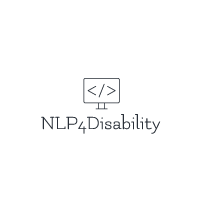About the Workshop
Natural language processing (NLP) is a branch of artificial intelligence that deals with the interaction between humans and computers using natural language. There is a growing body of research on natural language processing (NLP) and people with disabilities. This research is motivated by the fact that NLP can be used to enable people with disabilities in various ways. For example, NLP can be used to automatically generate captions for people who are deaf or hard of hearing. NLP can also be used to improve the usability of text-based interfaces for people with visual impairments. In addition, NLP can be utilized to help people with cognitive disabilities such as autism or dyslexia.
There are many challenges that need to be addressed in order to make NLP technologies more accessible to people with disabilities. The first challenge is that most NLP research is based on English, and there is a need for more research on other international languages. The second challenge is that NLP technologies are often designed for the able-bodied, and need to be re/adapted or re/designed to meet the needs of people with disabilities. Lastly, NLP technologies need effective evaluation methods and metrics to ensure that they are actually helpful for people with disabilities.
The future of NLP and disabilities is promising. As NLP technologies continue to be conceived, designed, and developed, it is necessary to promote universal design principles, accessibility and usability to better cater them for people with disabilities. Therefore, the aim of this workshop is to bring together researchers working at the crossroads of natural language processing and technology for people with disabilities to share their work, learned experiences and ideas. We believe that this workshop can offer this expert community a platform to facilitate collaborations across countries, continents and languages to both tackle existing limitations and innovate for the future.
PETRA conference and workshops, which will be held on July 05 - July 07, 2023, in Corfu Island, Greece , with expected arrival on July 04, 2023.
Authors of selected papers from NLP4Disability will be invited to submit an extended and improved version to a Special Issue published in Nafath newsletter (ISSN: 2789-9144) indexed in DOAJ and Google Scholar.
Topics
This workshop will explore how natural language processing can be used to improve the lives of people with disabilities. Topics of interest include, but are not limited to:
- Automatic identification of disabilities from text
- Development of accessible natural language interfaces
- Generating alternative text descriptions of images for people with visual impairments - Improving automatic speech recognition for people with hearing impairments
- Accessible natural language interfaces
- Assistive technologies for people with disabilities
- Computational linguistics for people with disabilities - Language processing for people with disabilities
- Text processing for people with disabilities
- NLP Bias Against Disabled People
Committee
Organizing Committee
- Hend Al-Khalifa. Faculty at the Information Technology Department, College of Computer and Information Sciences, King Saud University, Riyadh, Saudi Arabia
- Zainab AlMeraj. Faculty at the Information Science Department, College of Life Sciences, Kuwait University, Kuwait
- Achraf Othman. Mada Center, Qatar
- Dena Al-Thani. College of Science and Engineering, Hamad bin Khalifa University
Program Committe
- Mourad Abbas General of Al-Tnall Al-Arabi in Algeria
- Fahriye Altinay Near East University, Cyprus
- Oussama El Ghoul Mada Center, Qatar
- Tawfik Al-Hadhrami Nottingham Trent University, UK
- Tamer Elsayed, Qatar University
- Aseel Almesad, PAAET Kuwait
- Fatemah Hussain, Kuwait University
- Hamdy Mubarak, QCRI
- Maram Hasanain, Qatar University
- Amira Dhouib, Mada Center, Qatar
Accepted papers
1) JUMLA-QSL-22: Creation and Annotation of a Qatari Sign Language Corpus for Sign Language Processing by Achraf Othman, Oussama El Ghoul, Maryam Aziz, Khansa Chemnad, Sammy Sedrati, and Amira Dhouib (Qatar)
2) Easy-to-Read Language Resources and Tools for three European Languages by MARGOT MADINA, ITZIAR GONZALEZ-DIOS,and MELANIE SIEGEL (Germany)
3) Practical Study of Deep Learning Models for Speech Synthesis by QUENTIN LANGLOIS and S´EBASTIEN JODOGNE (Belgium)
4) Fostering websites accessibility: A case study on the use of the Large Language Models ChatGPT for automatic remediation by Achraf Othman and Amira Dhouib (Qatar)
5) Towards a Measure for Empathy: a Cross-Language Investigation of #disability on Social Media by ZAINAB ALMERAJ and FATEMAH HUSAIN (Kuwait)
6) Towards Designing a ChatGPT Conversational Companion for Elderly People by Abeer M. Alessa and HEND S. AL-KHALIFA (Saudi Arabia)
